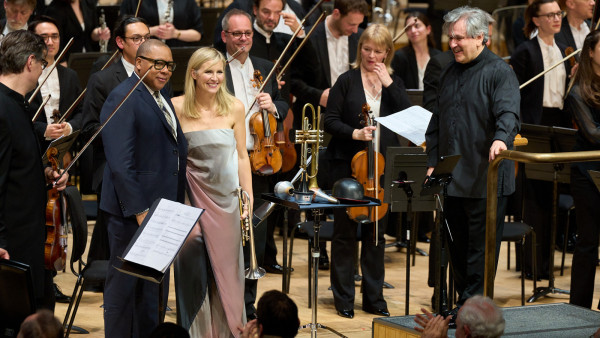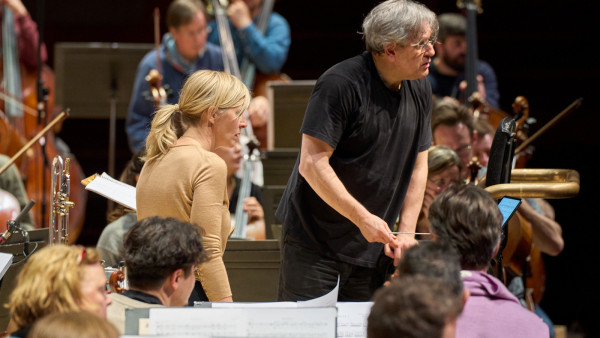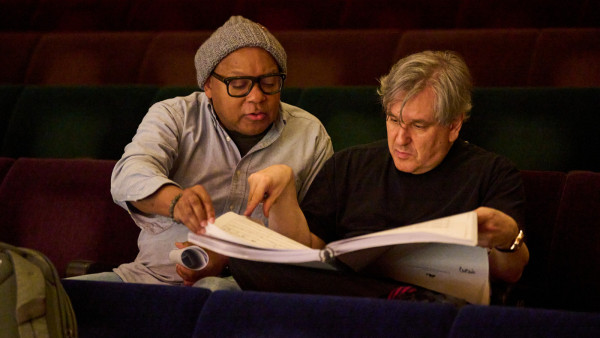Alison Balsom gives the UK premiere of Wynton Marsalis’ Trumpet Concerto with the London Symphony Orchestra and Sir Antonio Pappano
Alison Balsom gives the UK premiere of Wynton Marsalis‘ Trumpet Concerto with the London Symphony Orchestra (LSO) and its Chief Conductor Designate Sir Antonio Pappano at the Barbican (11 April), with subsequent performances at Bristol Beacon (12 April); Philharmonie, Cologne (23 April) and Elbphilharmonie, Hamburg (30 April).
The work was co-commissioned by The Cleveland Orchestra, Verbier Festival, London Symphony Orchestra, Orchestre Symphonique de Montréal and Swedish Radio Symphony Orchestra. Alison Balsom first performed the work earlier this month with the Swedish Radio Symphony Orchestra conducted by Cristian Măcelaru and she cannot wait to join forces with the LSO and Pappano to bring it to UK audiences and beyond.
Alison Balsom commented, “I believe this to be the most important and impactful piece written for the trumpet in the last two hundred years or so. With its pioneering and extensive display of what we now know the trumpet is capable of, the piece shows the many characters the trumpet can inhabit, and the boundaries it joyfully disregards. It’s a huge challenge and includes every possible technical difficulty – but it’s all written and orchestrated so well, and with a musical point behind every idea, that it’s a pleasure to play from start to finish. The trumpet starts the piece with the most pre-historic ‘horn’ sound imaginable – wild elephant calls, travelling through the ancient and traditional with fanfares and ceremonial passages, jazz and the blues, Mexican flaring trumpet, mid-20th Century Copland-esque moments, the New Orleans church, all the trumpet mutes you can think of, the 19th century cornet/ Paris Conservatoire tradition, and finally a virtuosic tour de force Moto perpetuo. No one on earth understands the potential of the instrument more than Wynton Marsalis. The combination of his mastery of the trumpet and his sophisticated compositional style, coupled with my passion for championing the work, make this a pretty special and historic moment for both the trumpet, and the wider music world. I am doing less projects and concerts these days but am so excited to share this masterpiece with the world.”
The work is in 6 movements and is 35 minutes long. Marsalis himself describes the piece as follows:
“March begins with the blaring trumpeting of an elephant and a couple of big footsteps in response. The trumpet is partnered with timpani as it is in so many classical symphonies. A lyrical minor 7th phrase and its repeated triplet response provides a contrasting counter theme. We are soon introduced to some magical elements, like alternate fingerings and flutters and growls that give added flavour to our palette of expression.
Ballad is about a love feeling and the trumpet is partnered with oboe. The arpeggiated minor 7th lyrical phrase from the first movement is expanded into a fully developed strain and the fanfare triplets are transformed through higher registration and intention to evoke the youthful romanticism of doo wop. We continue in unabashed, openly romantic style of instrumental singing gifted to the world by Louis Armstrong and subsequently developed by many great trumpeters of all styles.
The solitary yet razor-sharp attack of the Spanish-inflected trumpet is a definitive aspect of the international trumpet sound. Mexican Son addresses the music of the Afro-Hispanic diaspora and begins with a recasting of the first movement main theme. We proceed into a Spanish Bolero with plucked, bowed and bounced strings over and under which trumpet and bassoon converse. Woodwind call and responses lead us into a modern Habanera and the trumpet sings with an accompanying retinue of French Horn counter lines. In the end, those Horns chant “Aum” as trumpet incants a prayer-cadenza that connects us to our ceremonial role as ambassadors to the afterlife (still signified by buglers’ solemn playing of Taps at the passing of soldiers).
Blues is a call and response, the principal mode of blues communication, as it is also the very definition of concerto. We begin with the introspection of a single note drone and woodwinds weaving pentatonic-based melodies through the various registers. A middle section features church evocations and the tension between secular and sacred that the blues always brings. In this iteration, the trombones and French horns preach a serious sermon, while the trumpet is that jokester always playing around during service. Trumpet answers the seriousness with playful vocalisms over the two-beat dance groove of a country string band. The preaching becomes more serious while the trumpeter triples down on irreverence. In the end, the transcendence of seriousness is acknowledged with an open brass chorale. We return to the lonesome blues with an impassive introspection that walks the pentatonic road connecting East to West and end with solitary violin drone with woodwinds and muted trombone weaving dispassionate colours.
French Pastoral is a brief lyrical waltz inspired by the legacy of French trumpet playing. This is a quirky, rubato three-way conversation with contrapuntal voices weaving in and out of tempo, register, timbre and key to create an impressionistic tapestry.
Harlequin two-step focuses in on the magical, ‘joker/trickster’ element that has been an undertone of the entire piece. Trumpet players like to defy authority. We like to play games and pranks. This movement opens the percussion toolbox to create mayhem and barely controlled chaos whilst the trumpet dances through it all. It develops themes from the other movements and is rooted in a circle dance groove from the Jewish tradition of Eastern Europe. Things build up and break down and build up again and again, but when all is said and done, we end up back in the jungle where that old elephant breaks loose. And with that final fanfare, the elephant saunters away and we realize that it all began when she first broke loose.”
Performance dates and information:
- Thursday 11 April, 7pm, Barbican, London
- Friday 12 April, 7pm, Bristol Beacon, Bristol
- Tuesday 23 April, 8pm, Philharmonie, Cologne
- Tuesday 30 April, 8pm, Elbphilharmonie, Hamburg
Source: Rebecca Driver Media Relations



